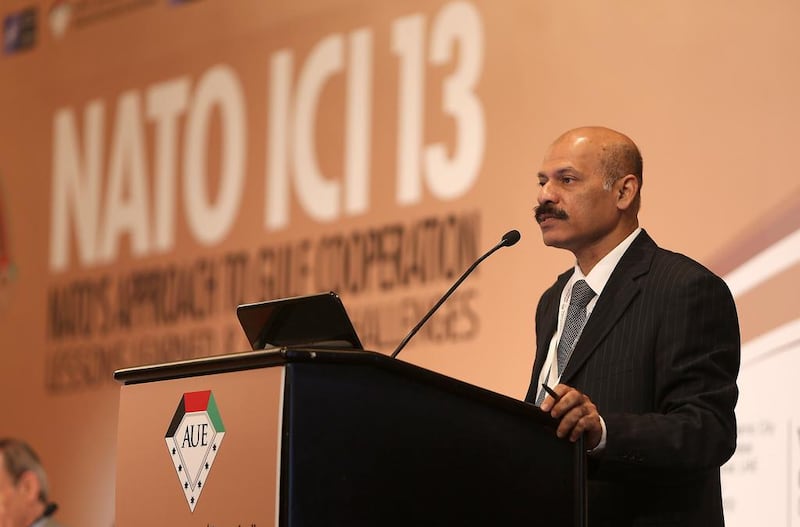DUBAI // Nato will have to focus more on issues in the Arabian Gulf to ensure its stability, security experts say.
Counter-terrorism, cyber defence, energy security and weapons of mass destruction are among crucial areas the alliance will have to tackle to improve its relationship with GCC states, the audience at the Nato ICI 2013 conference heard yesterday.
“What’s going on in Iraq and Syria poses serious security threats to the Middle East and the region,” Vural Altay, Turkey’s ambassador to the UAE, said at the meeting, which presented Nato’s approach to the Gulf.
“This necessitates much more collaboration of Nato with regional countries.”
Mr Altay said the partnership needed more engagement from both sides.
“Nato is nowadays ‘the’ military organisation’, and beyond that the organisation that can really bring security to all the troubled regions of the world,” he said.
“The first thing that needs to be done is to get rid of some prejudices that exist on both sides.
“Nato should look at this region in a more detailed manner, whereas this region should try to learn more about Nato.
“So more public diplomacy is a must in order to bring this relationship to a higher level.”
Areas that require attention include energy security, piracy and food security.
"Some issues that Nato face include transnational crime, terrorism, cyber-security, weapons of mass destruction and the proliferation part of it, as well as governance," said Dr Mohammad Amin, vice president of the American University in the Emirates.
“The global security threat has become very pronounced when you look into the current situation and Nato should really assess and look at precisely how they can go about improving it. We have to find out ways so that cooperation can be achieved.”
Dr Amin said promoting security interests on a collaborative form could be the emerging tone.
“Future challenges include counter-terrorism and cyber defence,” he said. “Engagement in security, humanitarian and development challenges must be looked into. We must address common concerns for the stability of the region.”
But Nato said it was ready to develop its Gulf partnerships further in modernising and building defence.
“A challenge will be to develop these areas as well as maritime and energy cooperation,” said Dr Rolf Schwarz, political officer of Mena at Nato’s political affairs and security policy division.
“Cooperation between Nato and the Gulf has evolved and there’s a need to continue building trust.”
But regional experts said more needed to be done.
“You see Nato with all its experience and our region that really needs security and support, and you don’t see much happening,” said Dr Abdullah Baabood, director of Gulf studies at Qatar University.
“There is a need for Nato here in terms of security, but there is a lot of work that needs to be done in terms of outreach and public diplomacy.
“There is a need for strategic dialogue – armies, defence structure and establishments welcome Nato – but it’s the political side of things that control them that need to be engaged with more and more.”
Dr Baabood said more focus should be placed on practical cooperation in maritime security and regional challenges.
But Nato officials said there was a need to promote a better understanding of the organisation in the region.
“The key is that it’s a two-way street,” said Nicola de Santis, head of Mena at Nato’s political affairs and security policy division.
“There are misperceptions but a lot has been done between Nato and Gulf governments that the public doesn’t know.
“Through partnerships, we can prevent conflicts and we’re trying to do this for more security, more stability, and ultimately more peace.”
Alessandro Minuto Rizzo, an Italian diplomat who is the president of the Nato Defence College Foundation and former Nato deputy secretary general, said the security guarantee in this part of the world had the “potential to grow with Nato. Security providers are needed in the Gulf”.
cmalek@thenational.ae






